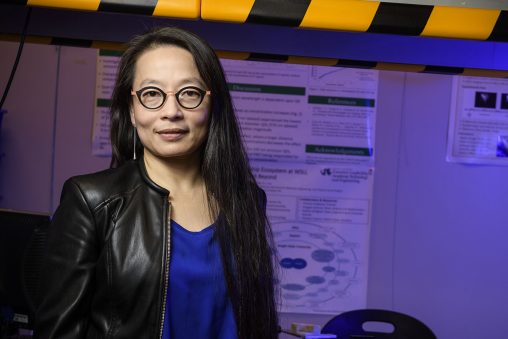
Wright State University’s Caroline Cao, professor of biomedical, industrial and human factors engineering, was elected Fellow of the Human Factors and Ergonomics Society and secretary-treasurer-elect of its executive council.
Wright State University’s Caroline Cao, professor of biomedical, industrial and human factors engineering, was elected Fellow of the Human Factors and Ergonomics Society and secretary-treasurer-elect of its executive council.
The society is the world’s largest scientific association for human factors and ergonomics professionals, with more than 4,500 members around the world.
“It is a great honor for me to be recognized by the society for my research contributions to the field and for my service to the society,” Cao said.
Members of the society include academic researchers, government lab researchers and practitioners in industry, with multiple disciplinary backgrounds such as human factors engineering, psychology, computer science, information science, human-computer interaction, biomechanics, mechanical engineering, medicine, biomedical engineering and product design, all of whom have a common interest in designing systems and equipment to be safe and effective for the people who operate and maintain them.
Earlier this year, Cao was selected by the society as a Science Policy Fellow. The science policy fellows will engage with policymakers on Capitol Hill to advocate for the support of science and technology in the budget and on the national agenda.
“I am excited and looking forward to learning about the process of science policymaking and to participating in the process through advocacy, outreach and building relationships with decision-makers,” Cao said.
Cao is also a professor of mechanical and materials engineering in the College of Engineering and Computer Science and professor of surgery in the Boonshoft School of Medicine. She was the Ohio Research Scholar for the Ohio Imaging Research and Innovation Network from 2012 to 2015 and is an expert in the design and evaluation of enabling technology, such as haptics, navigational aids and surgical simulation, for minimally invasive surgery.
The field of human factors engineering is applying the understanding of human capability in the design and development of technology to improve performance and safety.
Cao headed a team of researchers who invented a revolutionary medical device that could eliminate the need for radiation-emitting X-rays in image-guided minimally invasive surgical procedures. She also headed a research project aimed at improving robotic surgery in hospital operating rooms.
She is an expert on the use of imaging techniques, visualization and haptics in training physicians to do minimally invasive surgery. Instead of the traditional method of cutting open the abdomen and manipulating the tissues with the hands or surgical tools, tiny incisions are made, a miniature camera inserted and the operation performed with tiny chopstick-like instruments while watching the camera images. Recovery time for the patients is much faster, with lower rates of infection and decreased pain and suffering.
To train physicians, Cao has helped design surgical training simulators. The simulators make it unnecessary to use and sacrifice animals to practice on or to build expensive inanimate models that resemble tissue.
In 2018, Cao graduated from the prestigious Executive Leadership for Academic Women in Technology and Engineering Program, where she worked on ways to build an ecosystem for entrepreneurship at Wright State.
She spent the spring 2017 semester working with the International University of Vietnam National Universities in Ho Chi Minh City as part of a prestigious Fulbright Scholar fellowship.

 Wright State alum Lindsay Aitchison fulfills childhood space-agency dream
Wright State alum Lindsay Aitchison fulfills childhood space-agency dream  Wright State business professor, alumnus honored by regional technology organizations
Wright State business professor, alumnus honored by regional technology organizations  Wright State University Foundation awards 11 Students First Fund projects
Wright State University Foundation awards 11 Students First Fund projects  Gov. DeWine reappoints Board Treasurer Beth Ferris and names student Ella Vaught to Wright State Board of Trustees
Gov. DeWine reappoints Board Treasurer Beth Ferris and names student Ella Vaught to Wright State Board of Trustees  Joe Gruenberg’s 40-Year support for Wright State celebrated with Honorary Alumnus Award
Joe Gruenberg’s 40-Year support for Wright State celebrated with Honorary Alumnus Award 